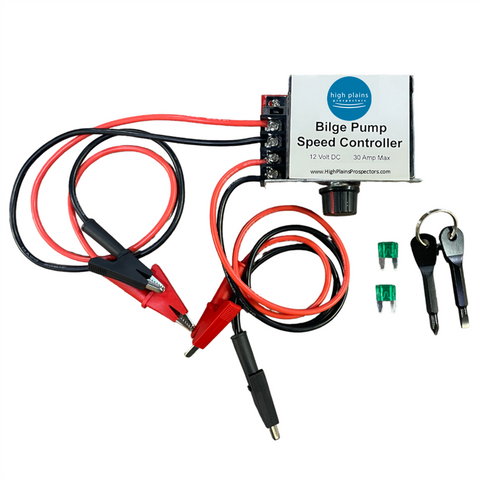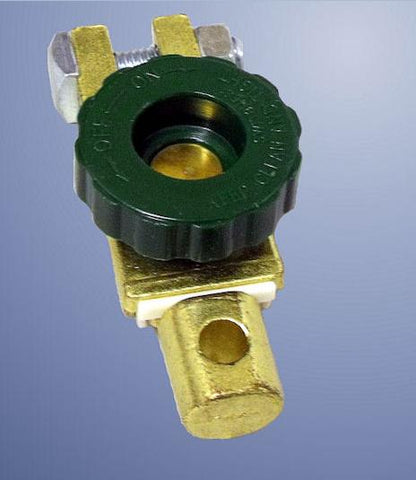Menu
FAQ: What is the best battery for powering portable gold prospecting equipment like a highbanker or trommel?

Choosing the right battery for your gold prospecting equipment can make the difference between a long successful day or a short stint ending in frustration.
Most motors for battery powered gold prospecting equipment are powered using a 12 volt battery. Just about any 12 volt battery will work. The main difference between these batteries is how long you can use them.
The short answer is that you need to choose a "deep cycle" battery to get maximum run time out of your equipment.
What is a Deep Cycle Battery?
Deep cycle batteries are crucial for providing sustained power over a sustained period of time. They are designed to withstand constant discharge and to then be recharged, ready to use again. Most people who are into fishing, boating, camping, and RVing are familiar with deep cycle batteries because they are used for things like trolling motors and powering low voltage lighting.
Deep cycle batteries look a lot like a normal car battery but they are different in how they perform over long periods of time and how they should be maintained. They are designed to provide reliable, sustained power over a long period. They will do this until they are roughly 80% discharged or more, at which point they will need to be recharged. Although deep cycle batteries can be recharged sooner than 80% many manufacturers recommend not discharging below 45%. This may help to extend the battery's life.
There are several different types of deep cycle batteries to consider when looking. Price is certainly a consideration but when it comes to gold prospecting things like weight, size, temperature resistance, and durability are equally important.
Types of Deep Cycle Batteries
Deep cycle batteries are designed to provide a steady amount of power over a long period and are capable of being deeply discharged and recharged many times. There are several types of deep cycle batteries, each with its own unique characteristics and applications. Here are the most common types:
-
Flooded Lead Acid Batteries: These are the traditional type of deep cycle batteries, where the electrolyte (sulfuric acid) is free within the cell and the battery must be kept upright to avoid spillage. They typically require regular maintenance, such as topping up the water levels. This may not be ideal for extended trips in the outdoors like gold prospecting but would work just fine inside a garage, back deck, or driveway.
-
Sealed Lead Acid Batteries (SLA): Also known as Valve Regulated Lead Acid (VRLA) batteries, these include gel and AGM (Absorbed Glass Mat) types. They are sealed and do not require the regular maintenance that flooded batteries do.
-
Gel Batteries: These contain a silica gel that suspends the electrolyte. They are less prone to spillage and can be used in various orientations. Gel batteries are more sensitive to high charging voltages and typically have lower peak power ratings than other deep cycle types.
-
AGM Batteries: In these batteries, the electrolyte is absorbed in a fiberglass mat. AGM batteries can handle higher temperatures and discharge rates than gel batteries. They are also shock and vibration resistant, making them suitable for marine, RV, off-road, and gold prospecting applications.
-
-
Lithium-Ion Batteries: These are more advanced and have a higher energy density, meaning they can store more energy than lead-acid batteries of the same size. Lithium-ion batteries have a longer lifespan, require no maintenance, and can handle deep discharge cycles better. They are, however, more expensive.
-
Nickel-Cadmium (NiCd) Batteries: Although less common due to environmental concerns related to cadmium, these batteries are still used in some applications. They are known for their ability to perform well in extreme temperatures and have a long life cycle.
-
Nickel-Metal Hydride (NiMH) Batteries: These offer a middle ground between NiCd and lead-acid batteries, with better environmental profiles than NiCd and larger capacities than traditional lead-acid batteries.
Each type of deep cycle battery has its advantages and disadvantages, making them suitable for different applications depending on factors like cost, weight, maintenance, lifespan, and environmental conditions.
Additional Products to Help You Get The Most Out of Your Batteries:
Bilge Pump Speed Controller (Rheostat)
A bilge pump speed controller can not only help you adjust waterflow to get the optimal conditions in your sluice box by speeding up or reducing the flow of water, they by lowering the power output you will find your battery will last longer versus going full power all the time.
Battery Terminal Disconnect Switch
A disconnect switch is a great way to quickly turn power on and off without having to clip and unclip the alligator clips all of the time. A great time saver as well!
You Might Be Interested In

Coin & Relic Cleaning Supplies
Pair text with an image to focus on your chosen product, collection, or blog post. Add details on availability, style, or even provide a review.
- Choosing a selection results in a full page refresh.














